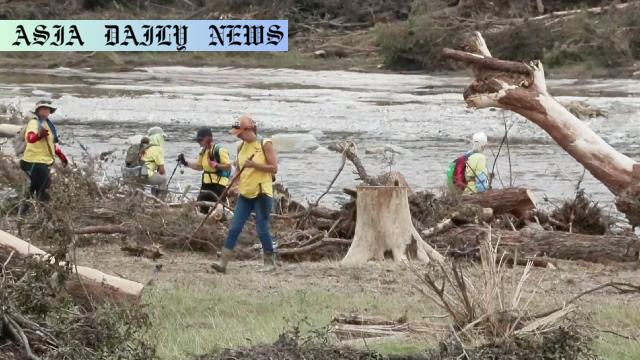Texas Flooding – The death toll from last week’s flash floods rises to 120, with over 160 individuals still reported missing.
- The Texas flooding death toll has risen to 120 individuals, with 160 still unaccounted for.
- Over 2,100 personnel, including Mexican firefighters, are searching extensively across 320 kilometers of affected areas.
- Governor Greg Abbott declared a special legislative session to address flood warnings and improve emergency response mechanisms.
- Communities along the Guadalupe River remain devastated, with impacts on families, summer camps, and local infrastructure.

The Devastating Toll of Texas Flooding
The state of Texas is reeling from catastrophic flash floods that began last Friday. The disaster has claimed the lives of 120 individuals and left more than 160 people unaccounted for. The Guadalupe River’s communities were inundated as heavy rain pounded the region, displacing families and altering lives forever. Among the missing are children attending a summer camp, a tragedy that has left the nation in shock. Search efforts are underway at an unprecedented scale, with over 2,100 personnel, including firefighters from Mexico, deployed to scour an area spanning 320 kilometers.
Mobilizing Resources for an Effective Response
Authorities have responded to the crisis by ramping up rescue and recovery efforts. Local and international emergency teams are working tirelessly under challenging conditions to locate the missing and provide relief to the affected communities. The search is not limited to human efforts; drones, boats, and advanced water rescue equipment have been deployed to navigate the flooded regions. The sheer breadth of the disaster has stretched resources thin, but the resolve of responders remains unwavering.
Legislative Actions in the Wake of the Flooding
On Wednesday, Texas Governor Greg Abbott announced a special legislative session scheduled for July 21. Key agenda items will focus on enhancing early warning systems and strengthening emergency communication infrastructures across flood-prone areas of Texas. The session will also examine the authorities’ response during the flooding to identify areas for improvement. Transparency in evaluating the disaster response is critical to ensuring a higher level of preparedness for future emergencies.
Examining the Human Impact
Beyond the statistics and legislative measures lies the untold human suffering of the flood victims. Families have been torn apart, homes destroyed, and livelihoods upended in the span of hours. Entire communities along the Guadalupe River are now grappling with unimaginable loss and the daunting task of rebuilding their lives. Humanitarian organizations and local charities have stepped in to provide food, shelter, and medical aid. However, long-term recovery will require concerted efforts from both government and private sectors to restore these devastated areas.
Building a Resilient Future
The Texas flooding has once again highlighted the vulnerabilities of communities in disaster-prone areas. Climate change and inadequate infrastructure have compounded the risks, demanding immediate attention. Investments in flood management systems, community education, and sustainable urban development must take precedence. The special legislative session convened by Governor Abbott is expected to serve as a platform for addressing these concerns. By learning from past mistakes and planning proactively, Texas can build a more resilient future for its citizens.



Commentary
The Human Cost of the Texas Flooding
Tragedies such as the Texas flooding are sobering reminders of nature’s brutal and unforgiving force. As we empathize with those who have lost loved ones, homes, and livelihoods, it is also essential to examine the systemic faults that exacerbated the destruction. These include insufficient warning systems and subpar infrastructure, which leave citizens unnecessarily vulnerable to extreme weather events. While it’s heartening to witness the dedication of rescue teams and volunteers, the larger issue of preparedness must be addressed with urgency.
Strengthening Disaster Preparedness
Governor Abbott’s move to convene a special legislative session is a proactive step in the right direction. However, the session must go beyond examining current failures and instead set the groundwork for future resilience. Enhancing early warning systems and improving emergency communication networks are crucial, but so is increasing public awareness about disaster preparedness. Community-based education and training can empower residents to act quickly and effectively during emergencies, potentially saving lives.
Addressing Climate Change and Infrastructure
The Texas flooding underscores the growing impacts of climate change, which brings more frequent and intense weather phenomena. Local and national policymakers must prioritize climate adaptation and mitigation strategies. This includes fortifying infrastructures such as dams and drainage systems and implementing stricter urban planning norms in flood-prone areas. Equally important is fostering global cooperation, as disasters of this magnitude often require international aid and expertise.
Hope Amid the Tragedy
Despite the overwhelming sorrow, stories of courage and solidarity offer glimmers of hope. The collaboration between U.S. and Mexican authorities in the search and rescue operation is a testament to the strength of humanity in the face of adversity. As the world watches, we must collectively push for accountability and systemic change to mitigate future disasters effectively. It is not just Texas’s responsibility but an essential global initiative to safeguard vulnerable communities from tragedies of this scale.